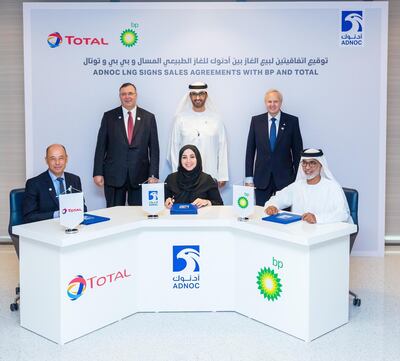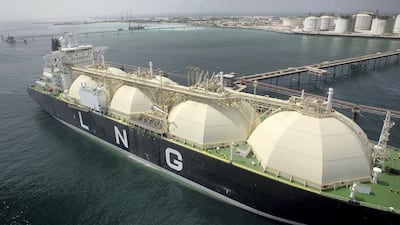Abu Dhabi National Oil Company signed agreements with BP and Total to book the majority of its liquefied natural gas production up to the first quarter of 2022.
"With these new supply agreements, Adnoc LNG has shown that it can react quickly and decisively to changing market conditions while ensuring the security and quality of delivery," said Fatema Al Nuaimi, Adnoc LNG chief executive.

“With the support of our shareholders, we have maximised access to new markets with strong LNG growth potential," she added.
Adnoc LNG is a joint venture between the Abu Dhabi state oil company, which holds the majority 70 per cent share, Japan’s Mitsui with a 15 per cent stake, BP has 10 per cent and France’s Total with 5 per cent.
Adnoc LNG produces 6 million tonnes annually of the super-chilled fuel from its facilities on Das Island, which has been operational since 1977.
Until April, Adnoc supplied 90 per cent of its LNG to Japan's Jera, its single biggest offtaker. However, the Abu Dhabi company has since diversified its customer base, supplying 90 per cent of its LNG volumes to clients in more than eight countries in South and South-East Asia, including India, China, South Korea, and Taiwan.
“The two-year LNG supply agreement contributes to the growth and flexibility of Total’s LNG portfolio and strengthens our longstanding relationship with Adnoc LNG,” said Laurent Chevalier, vice president Middle East, gas, renewables and power at Total.
Last week, Adnoc announced additional hydrocarbon reserves of 7 billion "stock tank" barrels of oil and 58 trillion cubic feet of conventional gas and 160tcf of unconventional gas, taking the UAE to the sixth position from seventh globally in terms of hydrocarbon reserves, according to data listed by the US Energy Information Administration.
The UAE is reliant on imports to meet its gas needs and growing demand for cleaner fuel to generate electricity and power industry. Unlocking its gas caps, much of which is sour – having high sulphur content – as well as utilising its new discoveries for additional LNG production is part of Adnoc's strategy to maximise value from the fuel.
Abu Dhabi can expect to develop significant LNG export capacity by 2024, consultancy Wood Mackenzie said last year.
On Tuesday Adnoc also signed an agreement with Rongsheng Petrochemical of China to explore domestic and international opportunities as it seeks to sell more products to customers in East Asia. The deal covers the sale of refined products from Adnoc to Rongsheng and the supply of liquefied natural gas to the Chinese company.
"The agreement covers domestic and international growth opportunities across a range of sectors, which have the potential to open new markets for our growing portfolio of products and attract investment to support our downstream and gas expansion plans," said Dr Sultan Al Jaber, Adnoc Group chief executive and UAE Minister of State.
Adnoc expects to invest about $45 billion (Dh165.3bn) in the downstream sector with partners over the next five years in Ruwais, with its domestic refining and chemicals capacities set to double and treble, respectively.
The Abu Dhabi company plans to build the world's largest integrated refinery by 2025. Rongsheng, which also has interests in chemicals and textiles, is an investor in high-value oil and gas projects.
“The strategic cooperation with Adnoc will ensure that our ZPC project, which will have a refining capacity of up to 1 million barrels per day of crude, has adequate supplies of feedstock," Li Shuirong, chairman of Rongsheng Group said in a statement.


